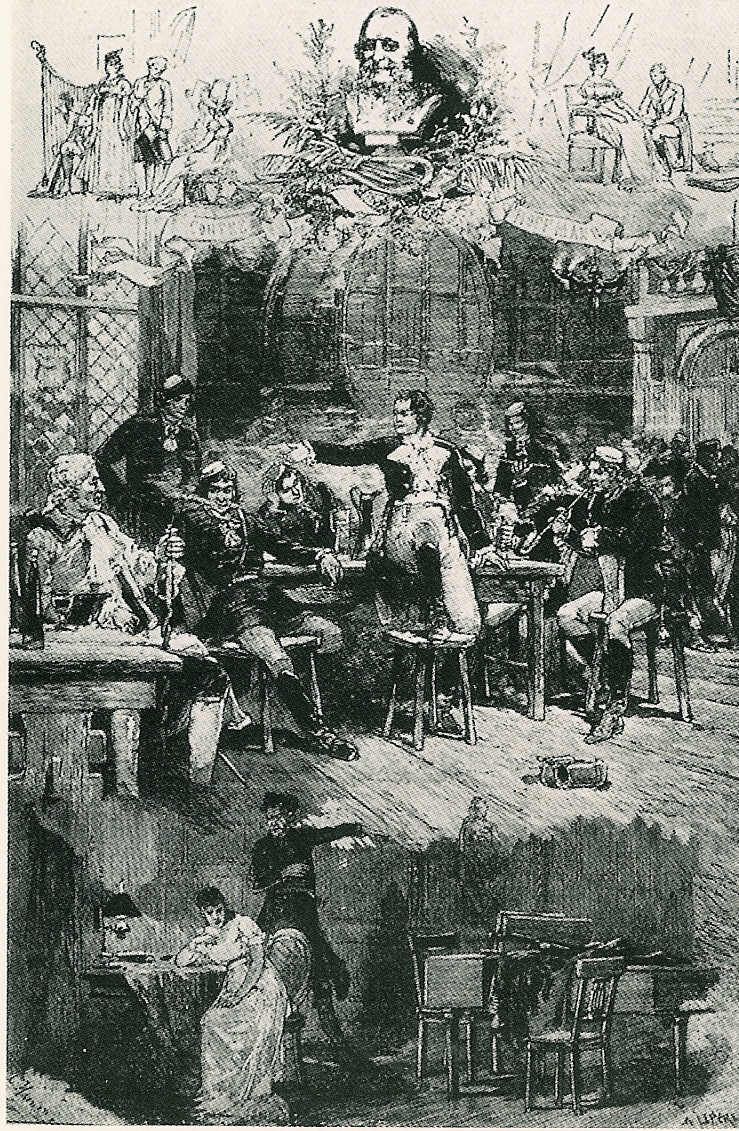
The Tales of Hoffmann
The Tales of Hoffmann (French: Les contes d'Hoffmann) is an opéra fantastique by Jacques Offenbach. The French libretto was written by Jules Barbier, based on three short stories by E. T. A. Hoffmann, who is the protagonist of the story. It was Offenbach's final work; he died in October 1880, four months before the premiere.
This article is about Offenbach's opera. For the 1916 silent German film, see Tales of Hoffmann (film). For the 1923 film, see The Tales of Hoffmann (1923 film). For the 1951 film, see The Tales of Hoffmann (1951 film).
Les contes d'Hoffmann
The Tales of Hoffmann
Offenbach saw a play, Les contes fantastiques d'Hoffmann, written by Barbier and Michel Carré and produced at the Odéon Theatre in Paris in 1851.[1]
After returning from America in 1876, Offenbach learned that Barbier had adapted the play, which Hector Salomon had now set to music at the Opéra. Salomon handed the project to Offenbach. Work proceeded slowly, interrupted by the composition of profitable lighter works. Offenbach had a premonition, like Antonia, the heroine of Act 2, that he would die prior to its completion.[2][3]
Offenbach continued working on the opera throughout 1880, attending some rehearsals. On 5 October 1880, he died with the manuscript in his hand, just four months before the opening. Shortly before he died, he wrote to Léon Carvalho:
The stories in the opera include:
Offenbach did not live to see his opera performed. He died on 5 October 1880, four months before its premiere, but after completing the piano score and orchestrating the prologue and first act. As a result, different editions of the opera emerged, some bearing little resemblance to the authentic work. The version performed at the opera's premiere was by Ernest Guiraud, after completing Offenbach's scoring and recitatives. Over the decades, new editions continue to appear, although the emphasis, particularly since the 1970s, shifted to authenticity. In this regard, a milestone was the Michael Kaye edition of 1992 (first performed on stage at the L.A Opera in 1988), but, then, additional authentic music was found, and published in 1999. In 2011, two competing publishing houses – one French, one German – released a joint edition reflecting and reconciling the research of recent decades. Here are some of the edition "variables" circulating since Offenbach died:
A version including the authentic music by Offenbach was reconstructed by the French Offenbach scholar Jean-Christophe Keck. A successful performance of this version was produced at the Lausanne Opera (Switzerland). Another edition, by Michael Kaye was performed at the Opéra National de Lyon in 2013 with Patrizia Ciofi singing the roles of Olympia, Antonia, and Giulietta ; and at Hamburg State Opera with Elena Moșuc singing the roles of Olympia, Antonia, Giulietta, and Stella in the 2007 production.[21]
In early 2016, Jean-Christophe Keck announced he traced and identified the full manuscript of the Prologue and the Olympia act, with vocal lines by Offenbach and instrumentation by Guiraud. The Antonia act and epilogue are in the BnF, while the Giulietta act is in the Offenbach-family archives.[22]
The opera is frequently recorded. Well-regarded recordings include: